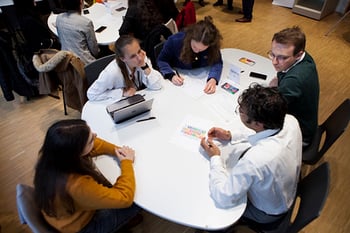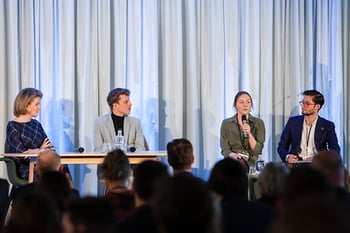Her Majesty is one of 17 SDG Advocates raising global awareness of the Sustainable Development Goals (SDGs) and the need for accelerated action. Together with The Shift, the Belgian meeting point for sustainability, she will organize 3 meetings in 2020 to engage with Belgian students on the SDGs. On February 20, 2020, we had the honor to host the first meeting together with the University of Antwerp and welcome management, business administration and economics master students from the University of Antwerp, Ghent University, Hasselt University, KU Leuven and Vlerick Business School at AMS.
In her opening speech Queen Mathilde talked about the growing visibility and the mobilization capacity of young people in favor of a more sustainable planet. “Not only because their future is at stake, but because they react promptly, they are connected, and they come up with creative solutions.” said Her Majesty. She continued her speech by addressing the present students directly: “you are clearly a huge asset to all those who care about the implementation of the SDGs. But you also need to be equipped with the right tools”. It is exactly this topic that is central to the event, because students from all over Flanders have gathered at AMS to discuss the importance of integrating the SDGs in their education.
Seeds for the future
 Students first addressed multiple questions in roundtable discussions: will integrating SDGs in business schools and universities enable students, the leaders of tomorrow, to develop more sustainable business models? Are the SDGs already sufficiently integrated and taught? Does economically oriented education deliver future CEOs who think according to the 20th century or do they deliver fundamentally different thinking future CEOs? It was fantastic to see the engagement and critical thinking of the students in these discussions. They questioned the number of SDGs, stressed the need for internships or best practices of integrating the SDGs in business, emphasized the importance of the role business plays in society and of long-term thinking, instead of only focussing on financial ratios.
Students first addressed multiple questions in roundtable discussions: will integrating SDGs in business schools and universities enable students, the leaders of tomorrow, to develop more sustainable business models? Are the SDGs already sufficiently integrated and taught? Does economically oriented education deliver future CEOs who think according to the 20th century or do they deliver fundamentally different thinking future CEOs? It was fantastic to see the engagement and critical thinking of the students in these discussions. They questioned the number of SDGs, stressed the need for internships or best practices of integrating the SDGs in business, emphasized the importance of the role business plays in society and of long-term thinking, instead of only focussing on financial ratios.
They showed great interest and ambition towards the SDGs and see them as an opportunity instead of a framework for risk aversion. Besides, they all agreed that the integration of SDGs in their education, not as a side-note or an optional course, is crucial in becoming a strong leader fit for the future. Lotte Boven, student at KULeuven even suggested that we should start integrating sustainability early on in education, not only in business education. “If you start early, in primary school for example, good leadership qualities will follow on its own.” she said. Additionally, through engaging with fellow students from other universities and business school students were able to gain new perspectives and learn from each other. “I really enjoy engaging in the roundtable discussions with students from different Flemish universities on challenges related to the SDG framework,” said Laura Koninckx, student at the University of Antwerp. “This event is a great example on how to motivate students to participate in impactful projects related to sustainability. Personally, I can only encourage these inter-college initiatives as seeds for the future.”
2030 is tomorrow, talking about the SDGs is not enough
The roundtable discussions were followed by an inspiring keynote by Jonas Mallisse, country manager of Too Good to Go, a global social impact enterprise dedicated to tackling food waste in the restaurant, retail and catering industry. In his keynote he showed the value of waste and that by rethinking certain things that we take for granted, such as food waste, great business models can arise.
 The topics the students discussed with each other during the roundtable discussions, were central in the panel discussion with Queen Mathilde, Minister Alexander De Croo (minister of Finance and Development Cooperation), Jonas Mallisse and six student representatives. All represented universities and business schools selected one student to represent their institute in the panel. The students all presented their key takeaways of the roundtable discussions and not only focussed on the enablers of the SDGs, but also on the challenges of integrating them. Habi Sow, student at Hasselt University, expressed that “the internal structure of the organization can be a challenge and even turn into a barrier. Employees and managers may be resistant to change and bureaucracy can hinder the process of change.” Both Thomas van Rompaey, student at Antwerp Management School, and Benjamin Mory, student at Vlerick Business School, stressed the importance of a level playing field where multiple stakeholder cooperation, government involvement and knowledge sharing are central. Justine Penneman, student at Ghent University, pointed out the importance of key performance indicators (KPIs) to accurately measure the progress made on achieving the SDGs. “Trusted and accurate information is needed to evaluate organizational strategy on the SDGs,” she said.
The topics the students discussed with each other during the roundtable discussions, were central in the panel discussion with Queen Mathilde, Minister Alexander De Croo (minister of Finance and Development Cooperation), Jonas Mallisse and six student representatives. All represented universities and business schools selected one student to represent their institute in the panel. The students all presented their key takeaways of the roundtable discussions and not only focussed on the enablers of the SDGs, but also on the challenges of integrating them. Habi Sow, student at Hasselt University, expressed that “the internal structure of the organization can be a challenge and even turn into a barrier. Employees and managers may be resistant to change and bureaucracy can hinder the process of change.” Both Thomas van Rompaey, student at Antwerp Management School, and Benjamin Mory, student at Vlerick Business School, stressed the importance of a level playing field where multiple stakeholder cooperation, government involvement and knowledge sharing are central. Justine Penneman, student at Ghent University, pointed out the importance of key performance indicators (KPIs) to accurately measure the progress made on achieving the SDGs. “Trusted and accurate information is needed to evaluate organizational strategy on the SDGs,” she said.
During the panel discussion Queen Mathilde emphasized that the students are the leaders of tomorrow, and stated the importance of continuing their interest in the SDGs in their future careers. "I hope that you will not only share your ideas during this panel, but transform them into actions in the future," she said and added "2030 is tomorrow, talking about it is not enough."
Mental wellbeing in the workplace
Before concluding the event, Her Majesty asked special attention for mental health and wellbeing in the workplace. As an SDG Advocate she is particularly focused on mental health. As the leaders of tomorrow, she believes that the contribution and implementation of the students present at the meeting is more than welcome in the strategy on mental health and wellbeing on the work floor. She asked the students to pay attention to this and to not overlook this important topic in the future.


